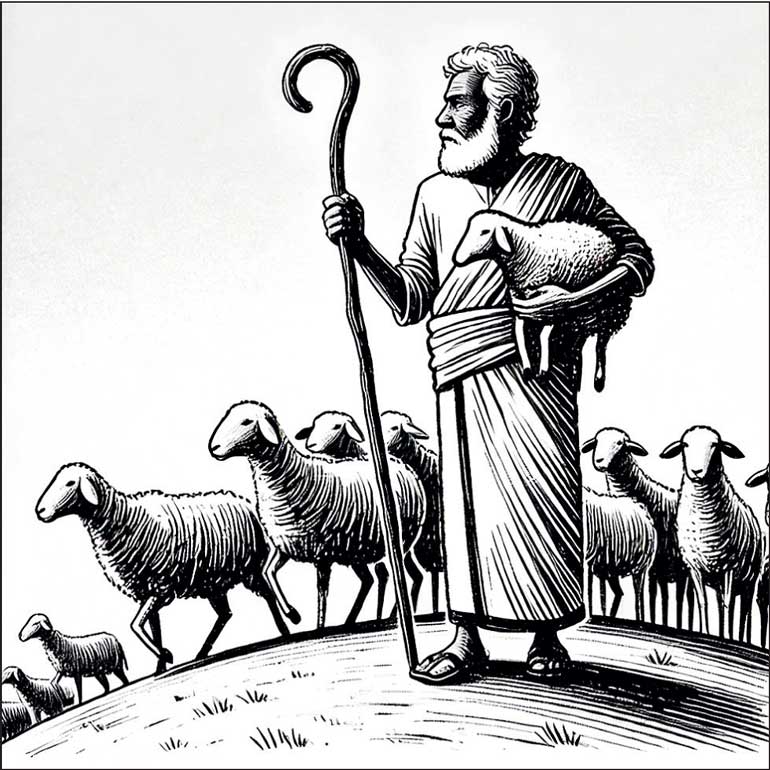Thursday Feb 19, 2026
Thursday Feb 19, 2026
Friday, 21 March 2025 00:24 - - {{hitsCtrl.values.hits}}

 Despite 78 years of independence, Sri Lanka has yet to find the right leadership—one that combines vision, integrity, and the ability to bring about long-term, meaningful change. Instead, the nation has endured cycles of mismanagement, corruption, and short-sighted politics that have left it struggling to reach its full potential.
Despite 78 years of independence, Sri Lanka has yet to find the right leadership—one that combines vision, integrity, and the ability to bring about long-term, meaningful change. Instead, the nation has endured cycles of mismanagement, corruption, and short-sighted politics that have left it struggling to reach its full potential.
This is not due to a lack of intellectual capability among Sri Lankans. In fact, Sri Lankans are known for their sharp intellect and hold key leadership positions in global institutions, multinational corporations, and international organisations. Yet, when it comes to political leadership at home, the country has failed to produce statesmen with the calibre to lead it towards sustainable progress.
The missing Shepherd Leader
Sri Lanka has seen various types of leaders—charismatic, authoritative, populist—but never a Shepherd Leader, one who leads with humility, wisdom, and a genuine commitment to the well-being of the people. Many have used political power for personal gain, while others have lacked the courage or vision to implement real reforms. Leadership has often been about survival rather than service.
This problem is not solely the fault of politicians. The Sri Lankan electorate bears significant responsibility for repeatedly electing the same kinds of leaders, often driven by emotions, party loyalty, or short-term promises rather than a careful assessment of leadership quality. Instead of demanding integrity and long-term planning, voters have often fallen for populist rhetoric and superficial gestures.
The impact of lost leadership
Sri Lanka has also suffered tragic losses of capable leaders due to political assassinations. The LTTE’s strategic killings of leaders such as Lalith Athulathmudali, Gamini Dissanayake, and Ranasinghe Premadasa robbed the country of some of its best political minds. These leaders, despite their flaws, had the intellect and drive to bring meaningful change. Their absence left a vacuum that has yet to be filled.
The aftermath of these assassinations contributed to a leadership decline, where political figures emerged not through merit or vision but through party dynasties, patronage networks, and populist manoeuvring. This has created a system that rewards political survival over national progress, leading to the worsening of governance with each passing administration.
A cycle that keeps worsening
At 58 years old, with decades of observing Sri Lanka’s political landscape, one can clearly see a whirlwind of repeated mistakes. The voting pattern continues to favour leaders who have already failed, ensuring that the nation does not move forward but instead worsens its already dire situation. The lack of a strong political culture that values accountability and results means that every election brings the hope of change, only to end in disappointment.
Despite economic crises, social unrest, and increasing disillusionment among the people, there has been no significant shift in how leadership is chosen. If this trend continues, Sri Lanka will remain trapped in a cycle of political decay, where each new administration only deepens the country’s struggles rather than solving them.
Can Sri Lanka ever break free?
One pressing question remains: What will it take to bring about a true shift in leadership and governance? Could a major economic turning point, a generational shift in thinking, or a strong grassroots movement finally break the cycle? Or is Sri Lanka at risk of repeating its past mistakes indefinitely?
Even with the present Government, the question remains: Could Sri Lanka strengthen its global engagement by ensuring that key cabinet positions—especially those involving international diplomacy—are held by individuals with the necessary skills to navigate the complexities of the international economic and geopolitical landscape?
While the search for a true Shepherd Leader continues, Sri Lanka’s political landscape remains at a crossroad, demanding bold and principled leadership to break free from past cycles. Until both leaders and citizens embrace a new approach to governance—one rooted in accountability, vision, and long-term planning—the search for the right leadership will remain elusive, and the nation will continue to bear the consequences.
(The writer is an Environmentalist/Wildlife Conservationist/Citizen Scientist.)